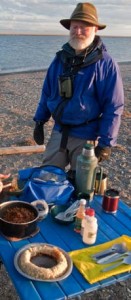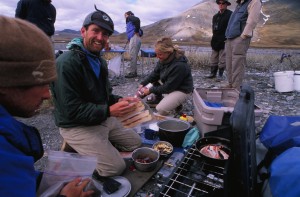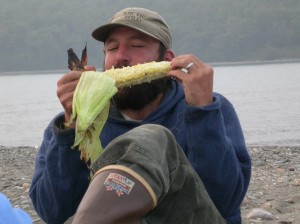Cooking in the Backcountry- Bill Mohrwinkel
Arctic Wild leads trips across Alaska and in all sorts of weather. But one thing all our trips have in common (other than great guides) is quality, nutritious food. Whether backpacking, rafting, or canoeing, you typically burn many more calories than in your normal day-to-day life. Food is fuel and if you like what you are eating out there, you’ll be happy and healthier. Delicious and well balanced meals add pleasure to each day and contribute to the health and safety of each of our trips. We hope the following information will be helpful in planning your own trip into the Alaska wilds.
Items to consider when coming up with your menu:
• Group size: How many mouths to feed?
• Mode of Travel: Are you backpacking- carrying everything on your back or rafting- floating it on water?
• Duration of trip: Plan an extra food if you are relying on a plane to pick you up or in a situation where you could get weathered-in.
• Exertion level: You will burn more calories backpacking than rafting.
• Climate/Altitude: You will burn more calories if it’s cold. When you’re at altitude, you will lose your appetite; bring food that is especially tasty.
• Appetites: A 17-year-old male eats a lot more than a 50-year-old woman.
• Food Preferences/ Allergies: Make sure you pack food that everyone likes and ask about food allergies.
• Nutritional Balance: Very important. I am not a big fan of going out with all freeze-dried food. It lacks adequate nutrients, tastes bad and it’s expensive. More about this below.
• Expense: You can find really good inexpensive food at your local grocery store. Most larger ones have excellent bulk food sections.
• Quantity: Here are some basic guidelines to work with:
Pounds/ Day/ Person:
- 1.5-1.75 (2500-3000 calories) – summer backpacking
- 2-2.5 (3500-4000 calories) Sea kayaking/ rafting
- 2.5 (4500-5000 calories) Mountaineering/ winter camping
Nutritional Balance is very important. You should have a good balance of Protein, Carbs and Fats. Think of eating like building a fire: Carbs are your kindling and protein and fats are your logs.
Some Food Ideas:
Breakfast:
-
Pancakes
- Hot Cereal
- Breakfast Burritos
- Granola
- Bagels/quick breads
- Breakfast meats
Lunch:
- Crackers
- Bagels
- Cheese
- Trail Mix
- Hot Lunch (instant soups, noodles-bring a thermos)
- Dried Fruit
- “ Energy” Bars (Cliff, Tiger, etc. There are thousands to choose from!)
- Chocolate!
- Jerky/meats
Dinner:
- Pasta
- Beans (dried)
- Rice (not instant)
- Lentils
- Couscous
- Soups
- Meat/fish/ meat substitute/tofu
Extras:
Dried or fresh Veggies
- Garlic
- Onion
- Cabbage
- Carrots
Hot Drinks:
- Coffee (real or Starbucks makes good instant)
- Hot Cocoa
- Hot cider
- Tang (great hot)
- Tea
- Powdered Milk and Honey
Spice Kit (aka food repair kit):
- Oil
- Soy Sauce
- Hot Sauce
- Salt and pepper
- Garlic
- Chili Powder
- Curry
- Cinnamon
Books:
I hope this helps you when planning food for your next outdoor adventure.
Coming soon: some of our favorite recipes and cooking tips!






